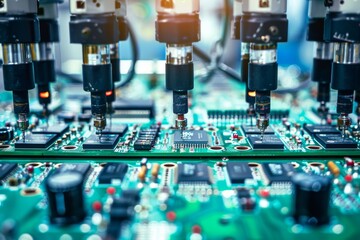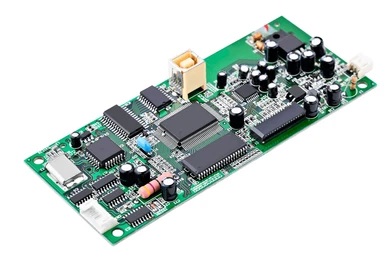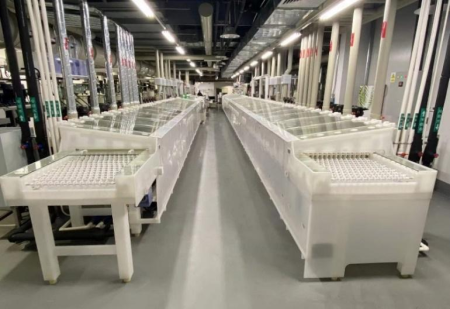- +86-755-23012705
- Building 3, Jinfeng Industrial Park, Fuyong Street, Baoan District, Shenzhen ,China
- [email protected]
The automotive industry has been rapidly embracing new technologies, driving the demand for increasingly sophisticated electronics in vehicles. From advanced driver-assistance systems (ADAS) to infotainment and electric vehicle (EV) powertrains, automotive electronics are at the heart of modern vehicles. A critical component of these electronic systems is the Printed Circuit Board Assembly (PCBA), which serves as the backbone of electronic circuits.
However, unlike consumer electronics, automotive PCBA designs face unique challenges due to the harsh conditions inside vehicles. These boards must not only function reliably but also withstand extreme environments of temperature, vibration, and other mechanical stresses.In this blog, we’ll explore the special requirements that automotive electronics place on PCBAs and the factors that manufacturers must consider to ensure their reliability and performance.
Reliability is the cornerstone of automotive electronics. Unlike consumer electronics, which may be replaced or repaired frequently, automotive systems are expected to function flawlessly for many years—often over a vehicle’s entire lifespan, which can be 10 years or more. Automotive PCBAs must meet the highest standards of reliability to ensure that electronic systems continue to perform without failure, even under extreme conditions.
Automotive manufacturers require PCBAs to have low failure rates, minimal wear, and excellent long-term stability. This includes preventing issues like component solder joint fatigue, oxidation, or delamination, which can lead to failure over time. To ensure this high level of reliability, automotive PCBAs often undergo rigorous testing, including accelerated life testing, thermal cycling, and humidity testing to simulate the long-term conditions the boards will endure in real-world vehicle environments.
Additionally, the automotive sector often demands functional safety certifications, such as ISO 26262, to ensure that critical systems like airbags, brakes, and steering controls remain operational under all conditions. High-reliability standards in automotive PCBA manufacturing are crucial, as any failure could have severe consequences for driver safety and vehicle performance.

Automotive PCBAs are exposed to a wide range of temperatures, from freezing cold in winter to extreme heat during summer. Under the hood of a vehicle, electronic components can experience temperatures ranging from -40°C to over 125°C, depending on the environment and the part of the vehicle in which they are located. For example, components near the engine, exhaust systems, or powertrain may face temperatures that exceed 150°C, which is much higher than the typical temperature ranges for consumer electronics.
To handle these extreme conditions, automotive PCBAs must be designed with materials that can withstand high temperatures without degrading or failing. This involves using high-temperature soldering materials, heat-resistant coatings, and specialized components that can tolerate thermal expansion and contraction cycles without cracking or warping. Additionally, advanced thermal management solutions like heat sinks or thermal vias are often integrated into PCBA designs to dissipate heat and ensure stable operation.
The selection of components is crucial. Automotive electronics manufacturers often choose automotive-grade components that are specifically rated for high-temperature environments. These components are designed to meet rigorous testing standards and ensure consistent performance over time, even under thermal stress.
Automobiles are constantly exposed to vibrations, shocks, and mechanical stress, which can have a detrimental effect on electronic components and circuits. The vibration levels inside a car can vary greatly, especially in areas like the engine compartment or suspension systems. For automotive PCBAs, it’s critical to design for vibration resistance to ensure that the boards do not fail due to these stresses.
Vibration can cause mechanical failure of solder joints, which can lead to intermittent or complete circuit failure. To mitigate this risk, PCBAs used in automotive applications are often designed with reinforced solder joints, stronger adhesive bonding, and shock-resistant enclosures. Components are often mounted in ways that reduce mechanical stress, such as through the use of flexible PCBs or rigid-flex designs that can absorb vibrations without causing damage to the circuitry.
Manufacturers may also use vibration testing methods to simulate the harsh conditions of road travel. These tests often involve placing PCBAs in a shaker table to replicate the mechanical stress the electronics will experience in a moving vehicle. This helps manufacturers ensure that the design can withstand prolonged exposure to both high and low-frequency vibrations.

To meet the demanding requirements of automotive electronics, the materials and manufacturing processes for automotive PCBAs are carefully selected. High-reliability PCBs often use high-density interconnect (HDI) technology and thicker copper layers to handle high current loads while maintaining signal integrity.
The selection of component materials is also crucial. Automotive-grade capacitors, resistors, and other components are chosen not only for their performance but also for their ability to endure harsh conditions such as temperature fluctuations, humidity, and mechanical stress. Additionally, high-performance solder alloys that can withstand thermal cycling are used in automotive PCBs to ensure that solder joints remain intact and conductive over time.
Moreover, encapsulation materials and conformal coatings are often applied to the PCBA to protect components from moisture, dust, and corrosive substances that might be encountered in the automotive environment. These coatings act as protective barriers that preserve the integrity of the board while providing extra insulation against heat, vibration, and environmental contaminants.
Automotive electronics must adhere to strict industry standards and certifications to ensure they meet the required safety and performance levels. Common standards include:
ISO 26262: Functional safety standards for automotive systems, especially for critical safety-related components.
AEC-Q100: A set of automotive qualification standards for semiconductor devices.
IATF 16949: Quality management standards for the automotive industry.
Meeting these standards requires comprehensive testing, documentation, and traceability throughout the design and manufacturing process. Automotive manufacturers often perform extensive reliability tests, including thermal cycling, vibration tests, and electromagnetic compatibility (EMC) tests to verify that the PCBA will function reliably in real-world conditions.

Automotive PCBAs are subjected to some of the most demanding environmental conditions, including extreme temperatures, vibrations, and mechanical stresses. To meet the special requirements of automotive electronics, manufacturers must design and produce high-reliability PCBs that can perform consistently over the lifetime of a vehicle. This includes using temperature-resistant materials, ensuring vibration and shock resistance, and complying with stringent safety and quality standards.
As automotive electronics continue to evolve, with innovations in autonomous driving, electrification, and connected vehicles, the demands on PCBA design and manufacturing will only grow. Ensuring that PCBAs can withstand these challenges is essential not only for the performance of the vehicle but also for the safety and satisfaction of the end user. By embracing these stringent requirements, manufacturers can help drive the future of automotive electronics with reliable, high-performance solutions that meet the needs of the modern automotive industry.
Simplify Your PCB Journey with XPCB Limited
XPCB Limited simplifies the PCB process for you. With our quick-turnaround prototyping and turnkey PCBA services, we ensure that your projects move forward smoothly and efficiently. Trust our commitment to quality and timeliness as we help you bring your designs to life. Choose XPCB Limited for a hassle-free PCB experience.






XPCB Limited is a premium PCB & PCBA manufacturer based in China.
We specialize in multilayer flexible circuits, rigid-flex PCB, HDI PCB, and Rogers PCB.
Quick-turn PCB prototyping is our specialty. Demanding project is our advantage.
Tel : +86-136-3163-3671
Fax : +86-755-2301 2705
Email : [email protected]
© 2024 - XPCB Limited All Right Reserve
